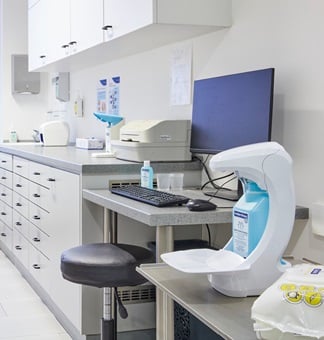Standard Precautions in Infection Control

Act together to build a positive safety and health culture in the workplace


For more than 100 years, the International Labour Organization (ILO), since 1946 also the first specialised agency of the United Nations (UN), has been dedicated to the development and implementation of international social and labour standards. Its primary goal is to create decent work for all. This also means establishing standards that reduce the number of work-related deaths, illnesses and injuries. Minimise risks, strengthen staff protection, build and promote a safe and healthy working environment. Pulling together for a strong positive safety and health culture at work - this is also the motto of this year's World Day for Safety and Health at Work, which the ILO celebrates every year on 28 April.
Safety and health at work – a relevant topic in the health sector
Healthcare workers are among the occupational groups that experience
a higher exposure to risks in the workplace. Daily contact with potentially
infectious materials, e.g. when taking blood samples and handling other bodily
fluids, poses a particular risk. Skin diseases caused by so-called wet work,
such as washing hands too often or wearing gloves for too long or
inappropriately, as well as the transmission of infections via needlestick injuries,
also pose an everyday risk. Moreover, the Coronavirus pandemic has once again
highlighted - not only in the healthcare sector - that a strong OSH system is
necessary and crucial for the protection of the working environment and the
safety and health of workers [1-6].
Act together to build a positive safety and health culture at work, at all
levels for a strong system! Join in and raise awareness for efficient
prevention measures. Take care of yourself and your health, actively
participate in infection prevention, comply with work standards and demand them
if necessary. Engage in dialogue too: Celebrate the World Day for Safety and
Health at Work on 28 April!
Important measures for your prevention in the health sector include, among others:
- Consistent hand hygiene at the right time: 5 moments of hand hygieneYou may find further useful information in our Hygiene Measures section: Hygiene measures, also specifically for emergency services: emergency services (hartmann.info).
Click here to see the ILO’s campaign: World
Day for Safety and Health at Work 2022: Act together to build a positive safety
and health culture (ilo.org)
Sources:
1. Eggert S. et al. Erfahrung mit Hygiene in
ambulanten Pflegediensten. Quantitative Befragung in der ambulanten Pflege.
Zentrum für Qualität in der Pflege (ZQP) Juni 2016.
2.
Dulon M.et al. MRSA carriage among healthcare workers in non-outbreak settings
in Europe and the United States: a systematic review. BMC Infectious
Diseases 2014; 14:363.
3. Berufsgenossenschaft für Gesundheitsdienst und Wohlfahrtspflege.
BGW-Themen. Risiko
Nadelstich Infektionen wirksam vorbeugen. Stand 06/2016.
4.
Soltanipoor et al. The effectiveness of a skin care program for the prevention
of contact dermatitis in health care workers (the Healthy Hands Project): study
protocol for a cluster. Trials. 2017 Feb 28;18 (1):92.
5. Händehygiene in Einrichtungen des Gesundheitswesens. Empfehlung der
Kommission für Krankenhaushygiene und Infektionsprävention (KRINKO) beim Robert
Koch-Institut (RKI), Bundesgesundheitsbl 2016, 59:1189-1220.
6. https://www.un.org/en/observances/work-safety-day (letzter Aufruf:
11.03.2022)